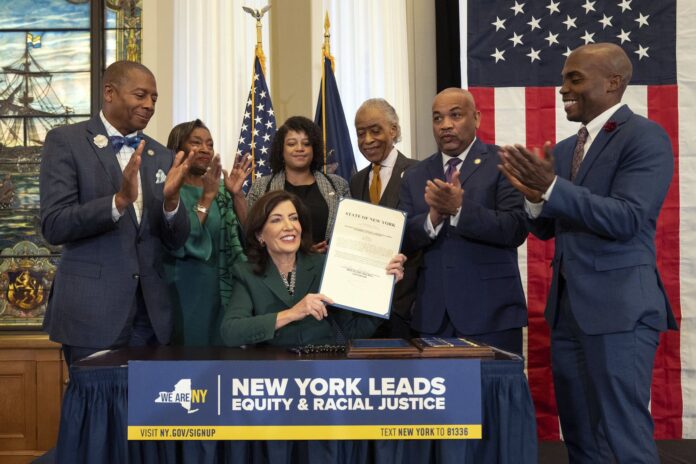
(CNN) — New York Gov. Kathy Hochul signed legislation Tuesday that establishes a commission to study racial justice and reparations.
“This commission acknowledges the horrific injustice of slavery and will be tasked with examining the legacy of slavery, subsequent discrimination against people of African descent, and the impact these forces continue to have in the present day,” a news release from Hochul’s office said.
The legislation creates a commission of nine members “who are especially qualified to serve by virtue of their expertise, education, training, or lived experience,” that will examine slavery “and its lingering negative effects on people currently living in the State of New York,” according to the governor.
The commission is then to provide a list of recommendations on how to address any issues found, the release said.
“Today, we are continuing our efforts to right the wrongs of the past by acknowledging the painful legacy of slavery in New York,” Hochul said in the release.
“We have a moral obligation to reckon with all parts of our shared history as New Yorkers, and this commission marks a critical step forward in these efforts.”
The commission is to submit its findings and recommendations at least one year after its first meeting date, according to the release.
New York City Mayor Eric Adams told reporters he feels reparations should be studied and the state cannot continue to “ignore the wrongs.”
“We never really dealt with or reckoned with slavery, and there’s some institutions that wealth is directly connected to slavery. It’s not like it’s a mystery,” he said. “There are institutions that are in place right now that their foundation came from free slave labor, and so we have to reckon with that.”
New York is not the only state to establish a commission to study reparations.
In June, a task force examining reparations for Black residents in California released its final report with more than 115 recommendations for how the state should compensate those harmed by slavery and “historical atrocities.”
Recommendations in that report, comprised of more than 1,000 pages, include a formal apology on behalf of California to descendants of people enslaved in the United States and recommendations for reforms linked to health care, housing, education and criminal justice, among other areas.

